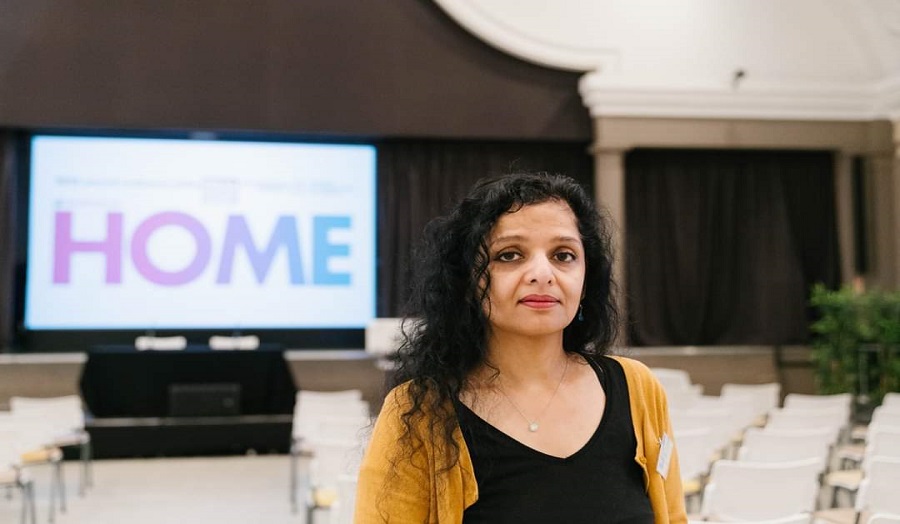This project is led by Dr Alya Khan, a senior lecturer in health ethics in London Met’s School of Social Sciences and Professions and member of the Global Diversities and Inequalities Research Centre and Centre for Life Writing and Oral History (CLiOH).
The project records untold stories and testimonies from minoritised ethnic communities using decolonising oral history methods.
The aim is to explore meanings of ‘home’ amongst racially minoritised communities of African, Caribbean, South Asian, Latin American and mixed backgrounds in London.
This project is supported by a London Met Rescaling Award held by Dr Khan in 2022.
This project employs a narrative ethics approach to exploring how relating diverse life stories may contribute to a culture of greater equity and inclusion in London and beyond. This connects with the use of a decolonising oral history method to co-produce previously unheard narratives on the themes of home, identity and belonging with racially minoritised communities in London.

Image: Dr Alya Khan at the Oral History Society Conference on 'Home'
More information
There are a number of reasons for the choice of the theme of ‘home’ for the project. ‘Home’ is an understandable focal point for studying diasporas and transnationality, fostering both a sense of belonging and alienation, and of different ways of being in the world. ‘Home’ also represents a site for connection and /or disconnection between communities; of inclusion and/or exclusion. Such patterns recur in public and urban spaces as well as more intimate settings. Hence ‘home’ can mean living in a city like London, or can conjure a more intimate dwelling space; or refer to someone’s country of birth, or that of their parents or grandparents.
The family can be an important intergenerational institution for communicating ideas of ‘home’, including values and beliefs associated with it. Thus ‘home’ can be associated, on the one hand, with domestic practices and symbols, but can also take on a more abstract quality. The study will provide scope to explore what ‘home’ means to racially minoritised communities in London whose histories have been marked by migration and the related legacy of empire and colonialism (see Patel, 20211; Hargrave, 20182; Brown et al 20213). Public histories of these communities have been written into legislation on immigration and nationality; health and wellbeing; policing and public order; and into discourses of wars for colonial independence and post-colonial settlements. This study will provide opportunities for participants from racially minoritised communities to contribute their own accounts of such events and experiences for the historical record.
-
Patel, I. (2021) We’re Here Because You Were There: Immigration and the end of Empire. Verso: London
-
Hargrave, R. (2018) Drawbridge Britain: Love and Hostility in Immigration Policy from Windrush to Present. Eyewear Publishing: London
-
Brown, Milton and Nicholson, Heather (2021) ‘ Windrush; the years after. A community legacy’ Oral History Vol 49, no 2 Autumn
Aim
- To explore narratives of ‘home’ amongst racially minoritised communities of African, Caribbean, South Asian, Latin American and Mixed backgrounds in London
Objectives
- To explore diverse meanings of ‘home’ as narrated by those from racially minoritised communities in London
- To explore the family as a site for developing and contesting intergenerational understandings of ‘home’ amongst these communities
- To explore interrelationships between private memories and public histories of ‘home’ in relation to racially minoritised communities
- To explore the ‘homeplace’ as a site for building alternative narratives that challenge dominant discourses of racially minoritised communities
The project will involve oral history interviews with community-based participants from African, Caribbean, South Asian, Latin American and mixed backgrounds in London.
The project will result in:
- A proposal to present a panel, and an exhibition of photography, poetry and artefacts, at the Oral History Society annual conference on ‘Home’ in 2022
- A ‘Meanings of Home’ project archive of the oral history interviews to be housed at London Met
- A project research report
- Scholarly outputs, including peer-reviewed publications
Dr Alya Khan is the principal researcher. She is an experienced oral history researcher, having previously conducted oral history studies exploring the experiences of BAME students on a health and social care course (Khan and Gabriel, 2018; 2022).
Dr Khan’s project team comprises of six members of the University’s BAME Voice Staff Network and five final-year students, working collaboratively as oral history interviewers.
Interviewers are well prepared for the study, having undertaken an intensive oral history training course with Oral History Society expert trainers. The trainers are also available as project advisors throughout the interview process.
- Interviewer/research assistant: Janet Douglas Gardner
- Interviewer/research assistant: Mabel Encinas
- Staff interviewers: Harleena Jagde, Masuma Ahmed-Ali, Azar Sheibani, Kevin Brazant
- Student interviewers: Nancy Bueffler, Rejeena Khatri, Olufunke Aderinola, Theodora Ohemeng-Mensah, Olasumbo Kehinde, Nimao Arshe





